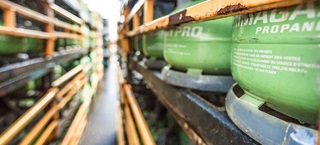Artificial intelligence for customer needs

Addressing the challenge
Primagaz’s data scientists, operational excellence specialists and the Global Innovation team collaborated on a fast-paced test and validation of critical assumptions.
In just a few weeks, the team created a machine learning model based on artificial intelligence. The model could be readjusted and fed new data on a daily basis to continuously improve its forecasting.
Testing the solution
This model was piloted successfully at six depots at the end of 2020. The tests demonstrated a 44% improvement in forecasts, enabling 7,000 fewer unnecessary cylinders to be transported. The gap between planning and delivery was also reduced, meaning customers received their orders more promptly when they needed them.
The model was enriched with new variables throughout the pilot and today it makes forecasts based on more than 400 variables from customer data.
The results
The new dynamic model was rolled out to all 40 depots in 2021, where it significantly reduced non-deliveries and improved customer satisfaction. On average, there was 180 less non-deliveries per month and 38,000 fewer unnecessary cylinders loaded per month on trucks.
As well as improving customer satisfaction, the model has also improved the working conditions of drivers, who will handle fewer full bottles when they return to the warehouse, as well as our carbon footprint, with trucks that return to the depot with a lighter load and therefore consume less fuel.

“The reliability of predictions, which are adjusted daily, gives a more structured vision to the dispatcher”
Emeline Bouvier, Cylinder Operation Manager, Primagaz France